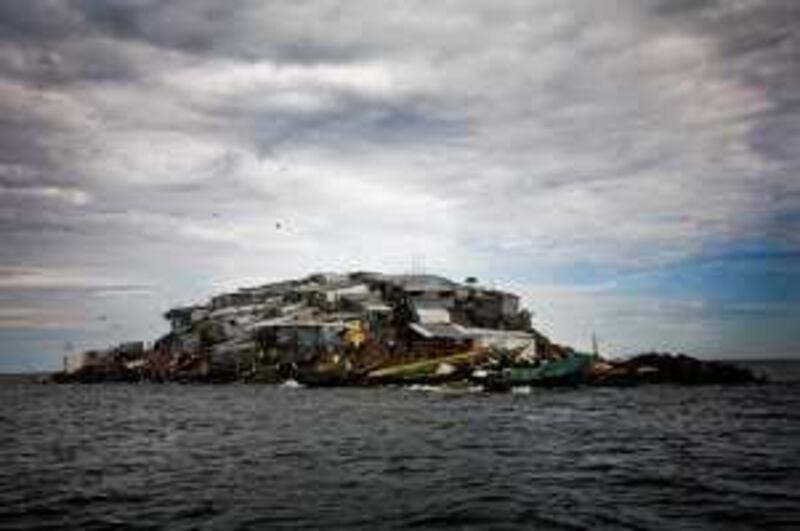MIGINGO ISLAND, KENYA // The biggest house on this tiny island in Lake Victoria belongs to the island's biggest man. Juma Ombori's massive, round body alone takes up a lot of real estate on Migingo Island, a speck of rock half the size of a football pitch. With his pudgy, jovial face, Mr Ombori seems an unlikely warrior on the front lines of an international dispute.
But the rock on which Mr Ombori's house sits happens to be surrounded by some of the richest Nile perch fishing grounds in Africa's largest lake, and Migingo is at the centre of a tug of war between Kenya and Uganda. Mr Ombori, the chairman of the island council, calls his large house "the Pentagon because this is where Kenyans gather to create ideas to counter-check the Ugandans". Fishermen began settling on Migingo in 2004, finding it a convenient base from which to fish the deep waters of the lake. The island is two hours from Kenya in a small, motorised boat and six hours in the other direction from Uganda. But it sits almost exactly on the border between the two countries and is claimed by both.
Initially, Ugandan security forces were stationed on the island and taxed the fishermen, most of whom are Kenyan. In January, Kenya sent a group of 11 police officers to reclaim the island, prompting Uganda to dispatch 50 soldiers to Migingo. This led to a tense round of brinkmanship between the two normally friendly countries. Yoweri Museveni, the Ugandan president, fanned the flames this month when he said that Migingo "may be in Kenya, but its waters are in Uganda". The statement caused an uproar in Kenya. In protest, residents of a slum in Nairobi, about 300km from the lakeshore, tore up a section of railway tracks, a main channel for goods from the Indian Ocean to landlocked Uganda.
The Kenyan police have since left the island as have the Ugandan soldiers. A handful of Ugandan security forces have remained while a joint team surveys the island to determine exactly where the border falls. If it were not for the bounty of fish in this part of the lake, no one would live on Migingo and the island would remain just an isolated blip on a map. "The main issue is not that island," said James Oching, an official with the Kenyan fisheries ministry. "It's the resources that are there. There is a lot of fish there."
In five years, the island's population has swollen to 500, mostly transient fishermen. Almost every square metre of this barren, rocky dome is covered in shiny corrugated metal shacks. Approaching the island by boat, the dwellings sparkle in the equatorial sun like scales of a giant Nile perch. On less than 4,000 sq m, there are four bars, a pool hall, a recreation centre with a big screen satellite TV, and shops selling everything from vegetables and cooking supplies to radios and clothes. There are 60 prostitutes on the island, more than 10 per cent of the population.
"The island is very nice," said Saul Odiambo, a Kenyan fisherman. "What we normally do here is fish. We spend most of the time in the water. We come here to sell the fish and get the money." The island is a microcosm of capitalism in action, and it all revolves around the Nile perch. At one end of the island, fishermen dock their boats and haul their catch up to the scales at the covered fish market. Buyers from the Kenyan side of the lake ferry out to buy fish and bring their purchase back to the lorries full of ice waiting on the lakeshore.
Nile perch is a huge business on Lake Victoria, earning about US$200 million (Dh734m) a year for Kenya, Uganda and Tanzania. Most of the fish is flown daily to supermarkets in Europe, Asia and the Middle East. The Ugandan security forces are occupying the island because of the revenue fishing brings in, according to the Kenyan fishermen. They say that the Ugandans intimidate the fishermen by charging them exorbitant taxes and sometimes stealing their catch.
"At times they are like beasts on the water," said Ojukwu Onyonyi, a Kenyan businessman who owns a fleet of fishing boats and makes regular trips to Migingo to buy fish. "These people have robbed us of a lot of money." For their part, the Ugandan police officers say they are just protecting the fishermen, of all nations, from pirates and bandits that ply these waters stealing engines off from fishing boats.
"We provide security to all people here," said Bernard Akankwasa, a Ugandan police superintendent on Migingo. "The Kenyans staying on this island are free to fish." The outcome of the survey, due in July, is expected to determine once and for all the true owner of the island. Most maps have Migingo just inside Kenyan waters, within 100 metres of the border. If the survey awards the island to Kenya, the Ugandans say they will pack up and turn the island over to Kenyan security forces.
But the Ugandans' continued presence on the island still angers some fishermen, namely Mr Ombori, the island chairman, who looks for ways to undermine Uganda's authority. "This is more or less like Gaza," he said. "We are living under occupation. Every now and then we have a riot. If they push us too much, we push back." mbrown@thenational.ae





